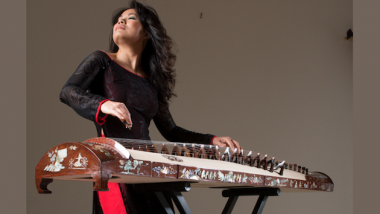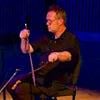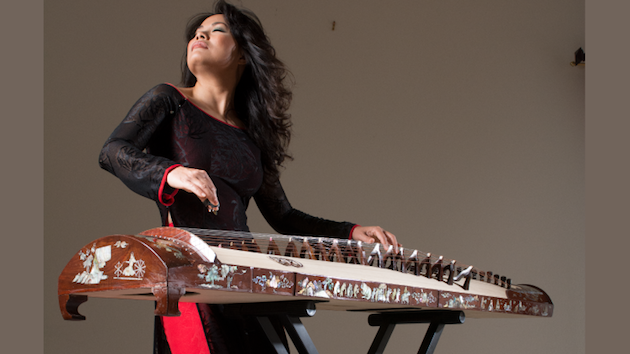
Correspondence with composer and multi-instrumentalist Vân-Ánh Vanessa Võ prior to an interview and during the coronavirus social distancing mandate reveals fears and frustrations shared by most performing artists. In addition to cancellations that mean vital income has disappeared and postponements that place upcoming projects and appearances in jeopardy, she’s yet to find a satisfactory online solution for rehearsing with her ensemble, conducting classes with students, or training with mentors and teachers in the customary way.
Since relocating to the Bay Area in 2001, Võ has made her mark as a virtuoso performer and rising composer and she has collaborated with artists from multiple genres. Võ’s signature compositions involve fusing Western and Eastern music with Vietnamese music played on traditional instruments — the zither (đàn Tranh), monochord (đàn Bầu), bamboo xylophone (đàn T’rung), traditional drums (trống) and others. Her ensemble was founded in the early 2000s as a way to test out compositional ideas for a project with a rap artist. Recently given an official name, Blood Moon Orchestra, the cross-genre ensemble expands Võ’s future, innovative projects.
While still in the deepest shadows of COVID-19, Võ said she could no longer speak about several of her projects and commissions with certainty. Even so, she maintains her usual energy, drive, and an ambitious schedule.
You told me you’ve sought ideas from other musicians about rehearsing remotely with your ensemble and teaching students. Have you received helpful suggestions for time syncing the live streams?
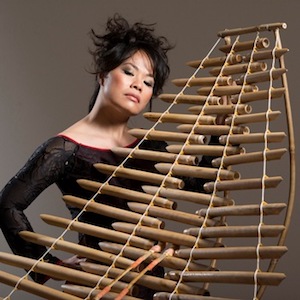
We haven’t been able to find a solution. Any platform out there, it’s too difficult to hear each other when we play together. If I stop playing, I can hear. If we talk at the same time, we have to stop and then we can fix something. But if we play at the same time, it’s impossible. I tried, Zoom, FaceTime, Skype, and a new platform that they said we could rehearse together on. But with that, you have to record yourself, send it to an ensemble player, and then they play along with the video. You sync with the video and it’s like playing a parallel track. It’s sad that we don’t have something, some technology — no matter how developed we are.
Due to the coronavirus, you’ve been participating in online events like the live feed for Silkroad Ensemble. What motivates your live or recorded online activities?
I do it as a volunteer to share. For Stanford Live I did one in early March, after my scheduled appearance had to be canceled. I created a positive message for them, a short video. I talk about how we should keep our spirits up and I had a short excerpt of my ensemble playing Infinity. It’s on their website.
I am scheduling for three more events: One is to teach a composer class for University of the Pacific, another is a concert for students at University of Santa Clara. That one will be the only one with a fee. I told her [the organizer] I would donate the $350 to an organization to help musicians. That’s in late April. They also asked me to do a second project we’re still discussing, so I can’t talk about that yet.
What are the criteria you apply to select the pro bono activities in which you will participate?
Basically, I have to think of what is meaningful. Is a project supporting a vision of why I do music in the first place? Does it help me promote the messages I want to teach? Does it go to a wider audience than the one I already know? I don’t really ask the presenter or put any of those things as the number one thing, but I do ask them to make an offer and then I go back when I think I can meet their request. If it supports my vision, I try to do it. Musicians have to be very careful about what they can give for free. For Santa Clara, I’ve done a number of small projects, so there is history. Most presenters have been pretty fair, whether it’s free or I am paid what they can afford.
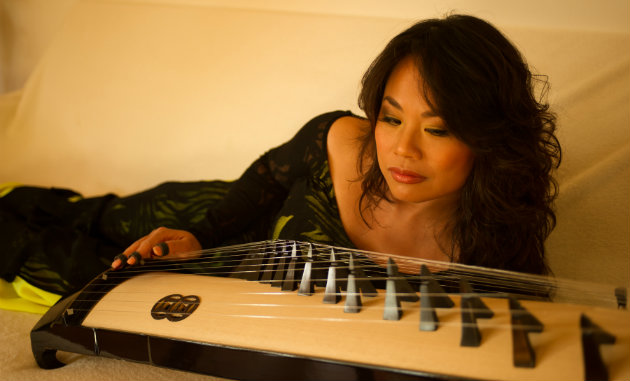
You also teach and lead workshops. Are you offering those courses online?
Yes. For workshops, with me just talking all the time and stopping for questions, that’s no problem. I can use any platform. But yesterday, I taught my elementary students through using FaceTime. With one lesson, I could see [the student], but the timing was out of sync. Obviously, I cannot play with her. The few seconds I can tape on my end and she can hear and play at the same time are very few. I also take lessons with my masters from Vietnam and that’s how we have to deal with it too. I can no longer play with them and hear both of us, which is the way I usually teach and practice.
Are these restrictions influencing your actual compositions, not just your activities and the ways you connect with other musicians?
To be honest, whatever is going around me, the number one thing when I write music is that I have to write something that’s really deep in my heart and my mind. It must be honest: healing pieces, anger pieces, I must be talking about something that is honest to my community and my experience or research I do. To root [my music] in that, what I plan to do during this time, I select mostly from what I already have. I cannot share my new music in this open forum now. I want to save it to share with people in the special place, the live theater. So I go through repertoire I already have that will unite people, to lift their spirits.
Healing is important right now. Finding a calm soul, you can do more things. Thanks to my previous projects — like the piece I did for the Oakland Symphony [Lullaby for a Country, Feb. 2016] and The Odyssey: From Vietnam to America piece [Jan. 2016, Yerba Buena Center for the Arts] — those are about finding the strength to move on to healing. I also have folk music that’s simple and honest, fun, or melancholy, but it gives people a good feeling. I can offer that too.
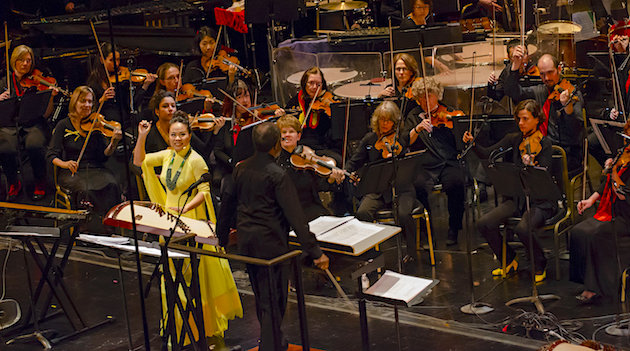
You have had appearances like the one at Stanford canceled and other projects postponed or rescheduled. What significance will that have on your work for the next year?
That’s a mixed situation. Some concerts I already know I have to reschedule. It’s better than the cancellations, but it doesn’t stop there. The budget for the rescheduled productions are being terribly cut down. Everyone has to adjust so much, so I don’t think it’s anyone’s fault. But the impact is that instead of having my ensemble do the work, it’s just me. Even then, I have to do it with less payment, maybe only 50 percent. It’s very sad and I thought at first the cancellations were only to July. Now it crawls to the end of the year and to next year.
Moving to something other than the current situation, will you speak about Blood Moon Ensemble and how you came up with the official name?
It’s not a new ensemble, but it’s the official name now. I chose the name because when I first moved here, I wanted to represent Vietnamese music and share the culture behind it. People here only know about the Vietnam War but do not know about the beautiful people, culture, history. In 2006, I decided I had to have a group that would allow me to do traditional music and to play with a rapper. It’s very far from traditional music to rap, it’s almost like the other end of the pole. But by 2010, I could collaborate with western classical music and jazz.
By 2016 I found a way to test out my ideas with a rapper. Right after that, I thought establishing an ensemble was doable, but I was having to do more research and be open-minded to lead a group having my same level of flexibility. In 2018, I thought about the Blood Moon phenomenon: when the sun, moon and earth are lined up. Finally, I could have all the elements lined up that I thought I needed to make this happen. That’s why I chose the name. It means a lot to me to have this name that we — the rappers, the musicians, and I — came up with.
You’ve completed several documentary soundtrack projects. Are film’s visual parameters and tight timing challenging?
I have no problem working with soundtracks. In Vietnam, I did this work all the time. There, in the studio, I would have to finish 50 cues of music in one night. The technology was so low-tech that the composer would have a stopwatch. He’d tell us the music and we had to play it, without even knowing it beforehand. He’d say it was eight seconds and if we played it in eight-and-a-half or seven-and-a-half, we would have to do it again. We were so nervous!
Doing it here, I could get the film images beforehand, talk to the composer, find out why they wanted it to happen a certain way, do research. I could come into the studio and already have the emotion. To record, I could look at the image and do it. It was very easy.
Has the nature of your collaborations evolved since moving to the Bay Area in 2001 or recently?
I always think that my growing up in Vietnam and now living here, shapes how I think. The differences between the countries are a guide to me. To share the music of Vietnam, I had to deal with challenges; even my Vietnamese-American community did not welcome me at first, because I was from North Vietnam. Because of the war, they think any Northerner would try to express the communism, no matter where they go.
I conquered that and helped them to understand that the difference is there, but also what it is. I make everyone proud of Vietnamese culture and music. Then, I had to take that into other music communities: to jazz and other places in which I do not know the culture. I have to find a way to learn, to share the differences, to find a same understanding.
That hasn’t changed, even though maybe in other ways, I now have to be more careful. I have to be honest: when people think of solo musicians, they think I can bring a better offer to them, financially. But my process takes a great deal of time. They might have to work with me a long time. I try to work with people who care about the quality of art, who will play the music exactly as I have written and also put their soul into it. My art is not doable without longer sound checks and I cannot play in places where people eat during the performance. But if I can find artists who will work for a longer time, the fruit comes later, and those I will work with.

